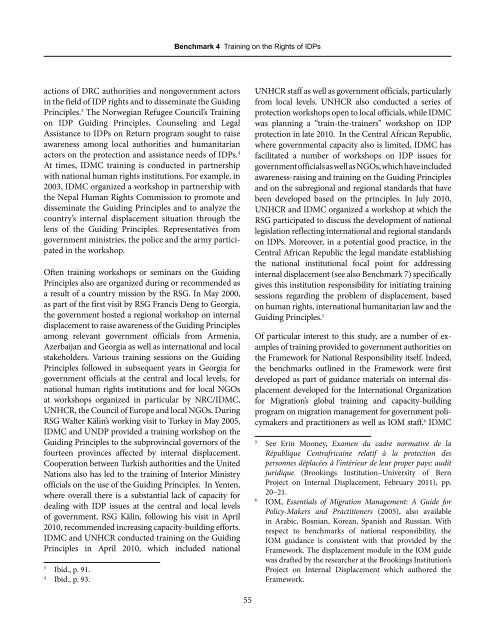From Responsibility to Response: Assessing National - Brookings
From Responsibility to Response: Assessing National - Brookings
From Responsibility to Response: Assessing National - Brookings
You also want an ePaper? Increase the reach of your titles
YUMPU automatically turns print PDFs into web optimized ePapers that Google loves.
actions of DRC authorities and nongovernment ac<strong>to</strong>rs<br />
in the field of IDP rights and <strong>to</strong> disseminate the Guiding<br />
Principles. 3 The Norwegian Refugee Council’s Training<br />
on IDP Guiding Principles, Counseling and Legal<br />
Assistance <strong>to</strong> IDPs on Return program sought <strong>to</strong> raise<br />
awareness among local authorities and humanitarian<br />
ac<strong>to</strong>rs on the protection and assistance needs of IDPs. 4<br />
At times, IDMC training is conducted in partnership<br />
with national human rights institutions. For example, in<br />
2003, IDMC organized a workshop in partnership with<br />
the Nepal Human Rights Commission <strong>to</strong> promote and<br />
disseminate the Guiding Principles and <strong>to</strong> analyze the<br />
country’s internal displacement situation through the<br />
lens of the Guiding Principles. Representatives from<br />
government ministries, the police and the army participated<br />
in the workshop.<br />
Often training workshops or seminars on the Guiding<br />
Principles also are organized during or recommended as<br />
a result of a country mission by the RSG. In May 2000,<br />
as part of the first visit by RSG Francis Deng <strong>to</strong> Georgia,<br />
the government hosted a regional workshop on internal<br />
displacement <strong>to</strong> raise awareness of the Guiding Principles<br />
among relevant government officials from Armenia,<br />
Azerbaijan and Georgia as well as international and local<br />
stakeholders. Various training sessions on the Guiding<br />
Principles followed in subsequent years in Georgia for<br />
government officials at the central and local levels, for<br />
national human rights institutions and for local NGOs<br />
at workshops organized in particular by NRC/IDMC,<br />
UNHCR, the Council of Europe and local NGOs. During<br />
RSG Walter Kälin’s working visit <strong>to</strong> Turkey in May 2005,<br />
IDMC and UNDP provided a training workshop on the<br />
Guiding Principles <strong>to</strong> the subprovincial governors of the<br />
fourteen provinces affected by internal displacement.<br />
Cooperation between Turkish authorities and the United<br />
Nations also has led <strong>to</strong> the training of Interior Ministry<br />
officials on the use of the Guiding Principles. In Yemen,<br />
where overall there is a substantial lack of capacity for<br />
dealing with IDP issues at the central and local levels<br />
of government, RSG Kälin, following his visit in April<br />
2010, recommended increasing capacity-building efforts.<br />
IDMC and UNHCR conducted training on the Guiding<br />
Principles in April 2010, which included national<br />
3 Ibid., p. 91.<br />
4 Ibid., p. 93.<br />
Benchmark 4 Training on the Rights of IDPs<br />
55<br />
UNHCR staff as well as government officials, particularly<br />
from local levels. UNHCR also conducted a series of<br />
protection workshops open <strong>to</strong> local officials, while IDMC<br />
was planning a “train-the-trainers” workshop on IDP<br />
protection in late 2010. In the Central African Republic,<br />
where governmental capacity also is limited, IDMC has<br />
facilitated a number of workshops on IDP issues for<br />
government officials as well as NGOs, which have included<br />
awareness-raising and training on the Guiding Principles<br />
and on the subregional and regional standards that have<br />
been developed based on the principles. In July 2010,<br />
UNHCR and IDMC organized a workshop at which the<br />
RSG participated <strong>to</strong> discuss the development of national<br />
legislation reflecting international and regional standards<br />
on IDPs. Moreover, in a potential good practice, in the<br />
Central African Republic the legal mandate establishing<br />
the national institutional focal point for addressing<br />
internal displacement (see also Benchmark 7) specifically<br />
gives this institution responsibility for initiating training<br />
sessions regarding the problem of displacement, based<br />
on human rights, international humanitarian law and the<br />
Guiding Principles. 5<br />
Of particular interest <strong>to</strong> this study, are a number of examples<br />
of training provided <strong>to</strong> government authorities on<br />
the Framework for <strong>National</strong> <strong>Responsibility</strong> itself. Indeed,<br />
the benchmarks outlined in the Framework were first<br />
developed as part of guidance materials on internal displacement<br />
developed for the International Organization<br />
for Migration’s global training and capacity-building<br />
program on migration management for government policymakers<br />
and practitioners as well as IOM staff. 6 IDMC<br />
5 See Erin Mooney, Examen du cadre normative de la<br />
République Centrafricaine relatif à la protection des<br />
personnes déplacées à l’intérieur de leur proper pays: audit<br />
juridique (<strong>Brookings</strong> Institution–University of Bern<br />
Project on Internal Displacement, February 2011), pp.<br />
20–21.<br />
6 IOM, Essentials of Migration Management: A Guide for<br />
Policy-Makers and Practitioners (2005), also available<br />
in Arabic, Bosnian, Korean, Spanish and Russian. With<br />
respect <strong>to</strong> benchmarks of national responsibility, the<br />
IOM guidance is consistent with that provided by the<br />
Framework. The displacement module in the IOM guide<br />
was drafted by the researcher at the <strong>Brookings</strong> Institution’s<br />
Project on Internal Displacement which authored the<br />
Framework.

















